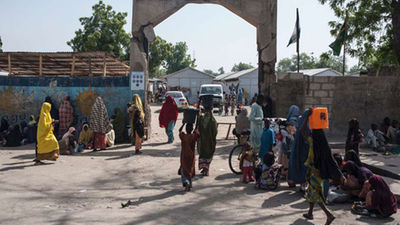Summary
- Now, with what officials say is improved security and a need for people to return to farms as famine looms, he is among hundreds of thousands of Nigerians being urged to go home after almost a decade spent in a camp for internally displaced people (IDPs) in the state capital Maiduguri.
- But on his way back home last month, the 53-year-old was shot by insurgents in a road ambush, he told AFP from his hospital bed, lying next to a dozen other weapon-wounded victims of the conflict.
- The government is however pushing ahead with its plan to close all camps by 2026, and so far it has shut seven of Maiduguri’s 13 camps which host between 100,000 and 150,000 people.
Usman Mohamed’s hometown of Baga on the shores of Lake Chad was once overrun by jihadists, forcing him to flee, like millions of others across the restless region.
Now, with what officials say is improved security and a need for people to return to farms as famine looms, he is among hundreds of thousands of Nigerians being urged to go home after almost a decade spent in a camp for internally displaced people (IDPs) in the state capital Maiduguri.
But on his way back home last month, the 53-year-old was shot by insurgents in a road ambush, he told AFP from his hospital bed, lying next to a dozen other weapon-wounded victims of the conflict.
His story is one of many others indicating that areas of Borno state are still unsafe, despite an overall decline in attacks on civilians compared with previous years.
The government is however pushing ahead with its plan to close all camps by 2026, and so far it has shut seven of Maiduguri’s 13 camps which host between 100,000 and 150,000 people.
The hope is to end what it says is an unsustainable over-reliance on humanitarian assistance.
Credits | AP, The East African

